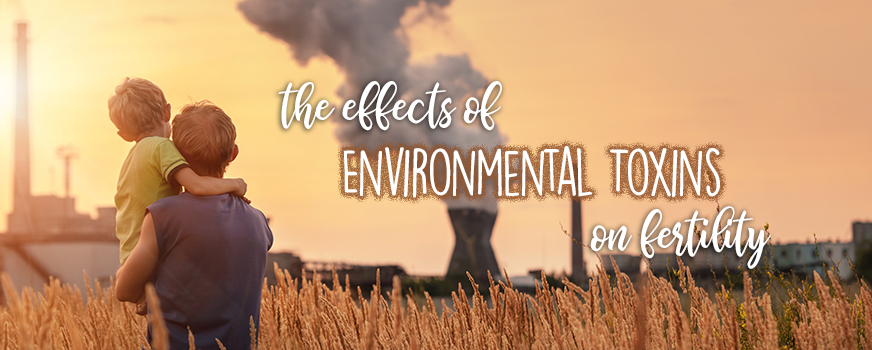
New studies have been released in the previous years to give women and men a better understanding of how some environmental toxins are affecting fertility. According to the NCBI, fertility worldwide is decreasing due both to choice and to difficulties conceiving. Understanding the rising number of difficulties when it comes to conceiving, researchers are taking a deeper look at the environmental toxins and how they affect both men and women. A recent study showed that environmental toxins can cause infertility in 4 ways:
- Endocrine disruption of hormonally active agents – these environmental toxins can change the hormone balance and affect the menstrual cycle.
- Damage to the female reproductive system – these environmental toxins can accelerate the aging of eggs.
- Damage to the male reproductive system – these environmental toxins can affect sperm numbers and/or quality of sperm.
- Impaired fetal viability & fetal maturity – these environmental toxins can increase the risk of birth defects and growth.
Not only do these damages caused by environmental toxins decrease natural fertility, but they also make infertility treatments such as IVF less likely to succeed in a pregnancy. Below are some of the environmental toxins that result in the worst fertility disruptors:
- Bisphenol A (BPA) chemical produced and found in some food and drink, hard plastic packaging.
- Phthalates found in soft plastic products.
- Parabens and benzophenone found in sunscreen and personal care products.
- Fire retardants found in electronics and furniture.
- Mercury & PCBs which is mostly found in frequently eaten fish such as tuna.
- Organochlorine compounds such as chlorinated pesticides, polychlorinated biphenyls, and dioxins that are present in most paper products.
- Organophosphate pesticides and herbicides, human-made chemicals produced to get rid of insects and mammals.
- Pesticides found in conventionally farmed produce.
- Plus additional chemicals, metals, and air pollutants found in other products.
These chemicals can be found in textiles, food packaging, cleaning & personal-care products, dental floss, shampoos, and non-stick substances. Now that you understand a little more about the foundation of environmental causes of infertility, it’s time to understand how to prevent exposure to these toxins when you’re looking to grow your family.
It’s safe to say that environmental toxins are all around us and we are all exposed to these toxins in a variety of ways. However, people at the highest risk of exposure to these toxins include those who live in specific areas of high pollution and those who work with environmental toxins on a regular basis. With that being said, it’s hard to completely eliminate your exposure to toxins, but there are a variety of ways to minimize the overall exposure tremendously.

Environmental Toxins & Your Food
Understanding what food you’re putting into your body on a regular basis, but especially when you’re trying to conceive, is extremely important. These are three main ways to help prevent environmental toxin intake through your food. First things first, it’s important to reduce your mercury exposure by eliminating certain fish from your diet. Next, opt for organic products when it comes to dairy, meats, and certain fruits and veggies.
Removing the greater chance of being exposed to these pesticides through your favorite foods is a quick fix! And finally, avoiding fatty foods that have the possibility of containing toxins is a key way to prevent those toxins from getting to you.
Environmental Toxins & Your Household Products
When it comes to testing for toxins in your home, it’s important to take a closer look at your everyday household product choices. There are a variety of ways to help eliminate environmental toxins by simply switching up the current products that you might be using. It’s time to say goodbye to the toxins and hello to fresh and simple.
Cleaning Products
This is the first step toward a toxin free home. Get rid of those chemical heavy household cleaners and start using simple and natural products instead. Learn more about some of the best natural cleaning products here!
Laundry Detergent
Laundry detergent has the possibility to be heavy with chemicals and toxins. Give plant based detergents a shot and see how your skin will thank you! Learn more about some of the best green laundry detergents!
Personal Care Products
Just like your stomach, your skin, your hair, and your nails are all craving natural products that provide proper nutrients and antioxidants to improve overall health. Learn more about what clean, non toxic beauty means!
Cookware & Storage Containers
When it comes to your cookware, it’s time to invest in a cast iron skillet and non-stick pots and pans. Using these products that are already designed to avoid sticking will allow you to avoid the use of non-stick coating products, and in turn avoid toxic chemicals. In addition to your cooking products, now is the time to de-plasticize your home. Read up on some of the best plastic free food storage containers!

Environmental Toxins & Your Consistent Cleaning Routine
Dust piling up throughout your home is prone to aggravating allergies and contains more hazardous toxins than you might think. If your home is mostly carpet, it’s important to vacuum frequently. A consistent cleaning schedule will remove those dust bunnies in the corner and will keep your home clean on a regular basis.
In addition to vacuuming, it’s important to keep other areas that are prone to house dust under control. It’s also important to get your home tested for lead, radiation, and other hazardous chemicals. Speak to your local health department today about getting your home tested.
On top of the main fixes listed above, there are a variety of other ways to help reduce toxins that might be building up in your environment:
- Washing your hands frequently with natural products can help reduce the buildup of toxins and other harmful elements in the environment.
- Don’t heat up your food in plastic containers and instead opt for glass or other safe food containers.
- Cook at home when possible in an effort to stick to fresh ingredients.
Now that you understand more about the environment and the toxins that surround us, it’s time to put your findings into play. With so many other factors surrounding fertility and the chance of pregnancy, cleaning up your surrounding environment is a great way to start your path toward parenthood. Learn more about what our team at Red Rock Fertility Center can do for you during this time, and schedule an appointment with a fertility specialist today.



